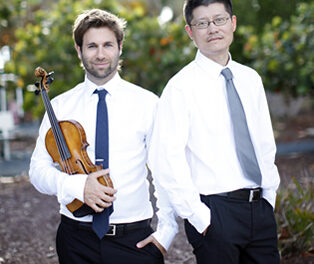Nothing shows the musicianship and technical quality of an orchestra like playing music by Wolfgang Amadeus Mozart (1756-91). Gerard Schwarz, music director of the Eastern Music Festival, was, early in his career, director of the Mostly Mozart Festival Orchestra in New York City. This depth of experience with the composer was evident in every bar of this All-Mozart concerto concert in Dana Auditorium, featuring faculty soloists and an aptly scaled Eastern Festival Orchestra.
Schwarz arranged six first violins and five second violins antiphonally, on either side of the podium. Four cellos and two double basses were seated behind the first violins while four violas were seated behind the second violins for the opening work, with additional players added for the remaining ones.
The concert opened with the rousing Horn Concerto No. 4 in E-flat, K.495. It was completed June 26, 1786, and was intended for Joseph Leutgeb, an outstanding virtuoso famous for his ability to sustain a singing tone with great precision and who inspired a number of composers. At the time, horns were valveless, so altering pitch was done by the player inserting his hand into the bell at various distances inside. The concerto is in three movements: Allegro moderato, Romanza: Andante cantabile, and Rondo: Allegro vivace.
Kevin Reid gave a warm and vibrant account of the horn part, displaying marvelous breath control and a refined palette of tone and dynamics. His ability to weave a seamless melodic line was shown in the middle movement, while a cadenza and the finale revealed his remarkable accuracy while articulating fast passages. Schwarz scaled the accompaniment to fit Reid’s performance like a glove. As EMF’s principal hornist, Reid is in his 17th season and his 20th season as principal of the Jacksonville Symphony Orchestra.
If one believes Mozart’s writings, he hated the flute. Perhaps it was more the fact he was never fully paid for a commission for a group of concertos and quartets for amateur flutist Ferdinand Dejean, a Dutch-German surgeon connected to the East India Company. The Flute Concerto No. 1 in G, K.313/285c, is the only complete original concerto. It was composed in February, 1778. It is in three movements: Allegro maestoso, Adagio ma non troppo, and Rondo: Tempo di Menuetto. Pairs of flutes, oboes and horns joined the strings already on stage.
Jake Fridkis simply played the socks of this concerto! Such brilliant and confident mastery might have warmed the composer to the flute. Breath-control seamed effortless. His tone was gorgeous and his dynamics finely graduated. His first cadenza was packed with florid fast runs, fast tonguing, and sustained notes while the second had trills aplenty. Fridkis’ seamless flowing melodic line in the middle movement was beautifully supported by pizzicato low strings and murmuring violins. His breathtaking playing of fast finale brought the house to its feet. Schwarz brought out the rousing martial quality of horns in the introduction and balanced with soloist perfectly. Fridkis is currently principal flute of the Fort Worth Symphony and is an alumnus of the EMF where he studied with EMF’s long-time principal flute Les Roettges.
After intermission, the concert continued with Violin Concerto No. 4 in D, K.218. It was composed in October, 1775, for violin solo and pairs of oboes and horns along with strings. Its movements are: Allegro, Andante cantabile, and Rondo: Andante grazioso. The strong contrast between the violin and orchestra has made it a favorite of virtuosos. After a fine stirring orchestral introduction, Jenny Grégoire entered playing with a sweet tone and immaculate intonation. Her phrasing was excellent and her sonority was full across its range. Her cadenza displayed razor precise high notes and impressive multiple stops. The middle movement featured a fine oboe solo and Grégoire’s mellow singing line while there was no lack of high spirits in the fast paced finale. Grégoire has been concertmaster of the Mobile Symphony Orchestra since 2001 and has been on the EMF faculty since 2004.
Piano Concerto No. 14 in E-flat, K.449, brought this concert to a richly satisfying conclusion. Mozart listed it into his catalog February 9, 1784, and it was intended for the exclusive use of his pupil Barbara von Ployer. In addition to piano and strings, it calls for pairs of oboes and horns. Its movements are: Allegro vivace, Andantino, and Allegro ma non troppo. William Wolfram brought great elegance and grace to the keyboard part. Articulation of fast passages was crisp and clear while melodic lines were spun tastefully. Quick tempo juxtapositions came off beautifully. His performance of the composer’s elaborate embellishments in the middle movement was done with great style. Schwarz provided wonderfully balanced and lively support ending in the clear dialogues between soloist and orchestra in the finale. Longtime member of the EMF piano faculty, Wolfram, was a silver medalist at both the William Kapell and Naumburg International Piano Competitions and a bronze medalist at the Tchaikovsky Piano Competition in Moscow. He has an extensive career as a soloist.
The Eastern Music Festival continues throughout July. See our calendar for more upcoming events.











